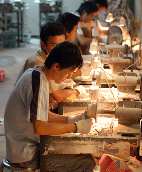Alexandra Harney, the Financial Times’s former South China correspondent, is the author of The China Price, subtitled “The true cost of Chinese competitive advantage”. Isabel Hilton, chinadialogue’s editor, sat down with her for a chat about environmental aspects of Chinese manufacturing.
Isabel Hilton: Your book is about the cost to China and the rest of the world of the Chinese mode of development. How would you assess the environmental costs, to China, of the “develop now, clean up later” approach?
Alexandra Harney: We all know the figures of half a million people dying each year of pollution-related diseases. The Financial Times has reported that it’s more like three-quarters of a million people passing away every year. Then there are untold numbers of people who are suffering from environmentally related diseases in villages and cities across China who don’t come into those figures. So I think that we are only beginning to scratch the surface of the public-health implications of China’s environmentally related disaster.
I asked, in my visit to a town outside Taiyuan, how many people suffered from a basic level of rhinitis [internal nasal inflammation] and other diseases. I don’t even think I saw the people who were really suffering because I think they were probably dead. They were suffering because of all the particles in the air and they all knew that it was partly related to working in the coal industry, in mining, but also partly because of everyone using charcoal in their homes – the indoor pollution that people sometimes talk about in China.
And in areas like that, as I saw, you have a microcosm of China’s environmental problems. People were at least superficially aware of the problem, but the desire for economic advancement overpowered any desire for clean-up.
IH: Do you think that remains true when people understand what the cost is?
AH: No. I think, for example, that when you visit one of these villages – the cancer villages, the villages where women are all widows because their husbands have died from injuries or illnesses contracted in manufacturing, or the villages where crops have been decimated by polluted water — people are smart. It’s perfectly clear to them how the environment is directly affecting them and their health.
There is increasing amounts of activism around the issue by the NGOs, who are doing interesting work. And I was really struck by all the protests by people in Xiamen and Shanghai, middle-class people who were taking to the streets about environmental issues. That’s massive. The numbers of environmental refuges are also interesting. [Deputy environment minister] Pan Yue himself says that there are tens of millions of environmental refugees – people pushed off their land, for instance, by environmental pollution. Those people are certainly aware of what is happening to them.
IH: Is there much understanding that there is a clean-up bill that has to be paid – and that there is a failure to discuss how this burden should be shared across society?
AH: I don’t think that the debate in China or elsewhere is that sophisticated yet. It would seem from the perspective of a Chinese factory manager that environmental compliance equals increased cost at a time when all of his other costs are rising. He knows that no one is going to share that cost with him, so why make the investment? He doesn’t even know if he will have a business next year.
And from the perspective of a local government – there are lots of kinds of officials in China. Some are genuinely concerned about the welfare of their citizens, while others are more concerned about their own personal welfare. Particularly in the countryside, I was very concerned about how negligent officials can be.
So I just don’t think that there is a sophisticated debate about these issues yet. In certain circles there is, but as a society I think it’s just at the very beginning.
IH: Nevertheless, China has a lot of regulations now. It has laws; it has a freedom-of-information law and right-to-know laws, as well as laws on pollution. In your view, what is the biggest problem about these laws being effective?
AH: Sometimes I think it’s a different conception of the law. I often heard, while researching my book, that a law was a “beautiful” law, that it was aspirational. Everyone knew that it was there as a goal to be attained, but that we needn’t bother about attaining it today.
So, I think that, in certain respects, there may be a different concept of the law. Certainly in Japan I saw that there was. So perhaps that’s part of it. Perhaps also there’s a genuine lack of priority on these issues and — as with the labour issues — there aren’t enough people on the ground to enforce it. Often the same people who are responsible for enforcing it are invested in the enterprise they are supposed to be policing.
That’s clearly a political issue and one that can’t be addressed with more laws, but with political reform. So perhaps it’s partly conception and partly a slow awakening to the realisation that “clean up later” comes at a great cost — and perhaps we need to start fixing it now.
IH: And in the years that you have been reporting on this, have you seen attitudes changing?
AH: People in business, who are involved in manufacturing, say that there has been an increase in supervision. I was struck by the man in the chemicals industry who told me that for particular projects above US$100 million, they would apply to the local government. The local government would put it to the central government, which would say: “That’s fine, but give us your environmental impact assessment — not just for your particular plant but for the entire region”.
And the company would say: “The local government officials would have that information, so why don’t you ask them?” And the central government would say: “They won’t tell us. You go and find out.”
So, essentially, the Chinese government was using a foreign company to do its homework for it because it had more leverage. Such an interesting development. The businessman said that he found much more scrutiny of their large chemical plant projects and that it’s much more difficult to get them approved right now. That strikes me as a substantial change.
Of course every day, across China, there are all sorts of environmental infractions going on, but in cities like Dongguan and Shenzhen there’s much more awareness. It may simply be that people would prefer, as one factory manager told me, to have upscale residential housing to dirty factories. But whatever is driving it, I see it fairly clearly in southern China at least, if not in inland areas.
Alexandra Harney covered Japan and China for the Financial Times. From 2003 to 2006 she was the paper’s South China correspondent. The China Price is her first book.
Isabel Hilton is editor of chinadialogue .
Homepage photo by mrk_photo





